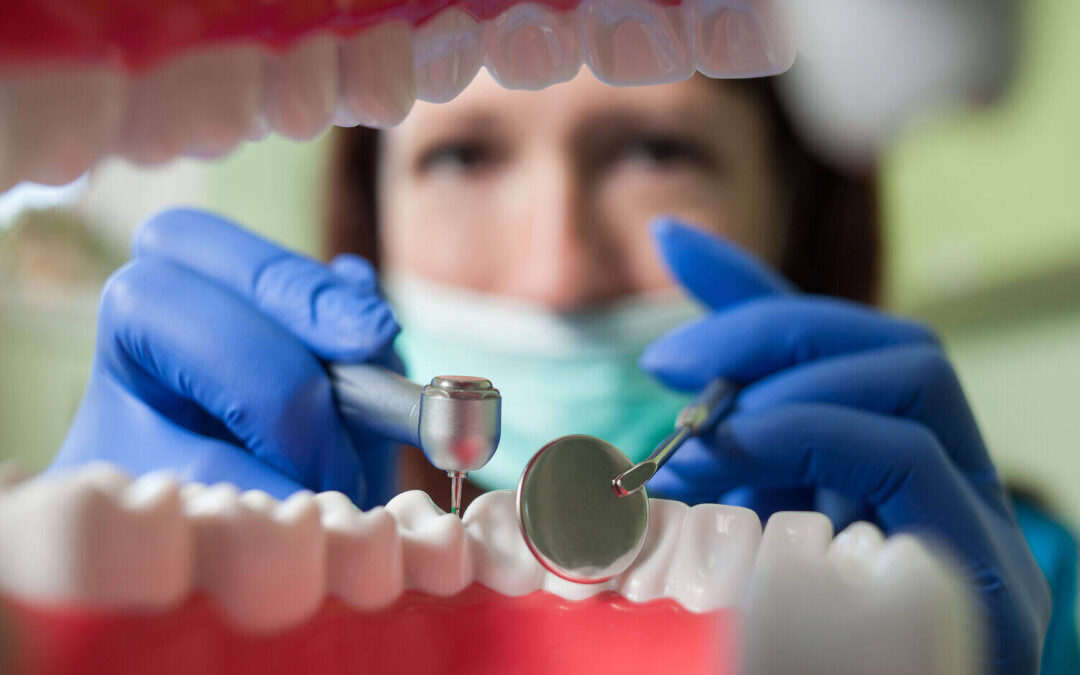Dental implant surgery is usually a straightforward procedure that anchors an artificial tooth root into the jawbone to restore functionality and aesthetics to your smile.
Every dental procedure is not without its own risks and complications. Post-operative bleeding can sometimes occur after dental implant surgery, but do not be alarmed – it is simply a natural part of the healing process. However, recovery can be accelerated with proper bleeding management at home.
As such, this guide will explain why post-dental implant bleeding happens and provide insight on a typical recovery timeline, managing bleeding at home, and when you should be reaching out to your dental implant dentist.
Bleeding During Dental Implant Process
During dental implant surgery, minimally invasive incisions are made in the gum tissues to expose the jawbone, after which the artificial tooth will be anchored into the bone. This process will naturally cause some degree of bleeding.
The process in which the bone is prepared and the implant fixture is anchored into the jaw, may also cause minor bleeding as there are small blood vessels in the bone around the implant site.
In both cases, bleeding is a natural response and is part of the healing process. Experienced dentists will be able to control the bleeding to ensure the dental implant procedure goes smoothly.
Timeline for Post-Dental Implant Bleeding
Understanding the expected timeline for post-dental implant bleeding is crucial for managing expectations during the recovery period.
- First Few Hours:
It is typical for you to continue to experience minor bleeding during the first few hours after the implant surgery. This may happen sometimes when the site is irritated by food or tongue or in some cases when local anesthetics wear off.
Your dentist will provide you with sterile gauze to bite down on. The act of biting firmly and constantly on the gauze applies pressure to the implant site, encouraging clot formation. It is recommended to bite at least 30 mins to 1 hour with firm pressure.
Clot formation is important because it serves as a protective barrier, covering the wound and initiating the healing process. It is vital to prevent excessive bleeding and promote the integration of the dental implant with the surrounding bone.
- First 24 Hours:
Bleeding should slow after a few hours post-operation, but some oozing or light bleeding may persist throughout the first 24 hours. Sometimes this might be during the night when laying down. This is still considered normal.
Follow your dental implant dentist’s instructions on biting firm and constant pressure on the given sterile gauze, as well as avoiding activities that could disturb the clot, such as eating on that side, brushing in that area or even exercises.
If minor bleeding happens when you are asleep, it can look like a lot of blood when you wake up to spit. This is because the blood can mix with your own saliva making it look much worse than it actually is.
- 24 to 48 Hours:
The majority of post-operative bleeding should subside within the first 48 hours. At this point, the clot will become more stable, and the healing process should be well underway. If you are still experiencing bleeding after the 48-hour mark, contact your dentist for expert advice.
Tips for Managing Post-Dental Implant Bleeding at Home
Effective home care is essential for a successful recovery from dental implant surgery. Here are a few practical tips to manage post-operative bleeding from the comfort of your home:
- Follow Dentist’s Instructions:
It goes without saying that you should adhere strictly to your dentist’s post-surgery instructions. This includes biting firmly and with constant pressure on the gauze for 30 minutes up to 1 hour. Avoid opening your mouth every several minutes to check if the bleeding has stopped, as often frequent checks can hinder the clotting process.
Make sure that you are making a thick ball with the gauze to bite on. If you feel that there isn’t much pressure when biting down, wrap another layer of gauze around the original clump of gauze to increase the size of the “ball”.
After biting for 30 minutes, you can check if bleeding has stopped. If it has not, change the gauze as the original gauze has likely softened with saliva. Then bite down on the new gauze for at least an hour. You should also avoid spitting as that will release the pressure on the wound site.
Sometimes, your dentist may prescribe antibiotics after the procedure. Please ensure you complete the full course of antibiotics.
- Practice Gentle Oral Hygiene:
Maintaining good oral hygiene is a given, especially after dental implant surgery. However, you should take care to be gentle when cleaning the surrounding teeth to avoid disturbing the implant site and the forming clot.
It is advisable to avoid cleaning around the wound site and not to swish fluids around your mouth as this may interfere with clot formation. To be safe, do not brush till the next day.
- Avoid Irritants:
Your implant site is an open wound, so you have to be mindful of what you consume to prevent irritating it. This includes steering clear of hot or spicy foods, as well as tobacco and alcohol, as these can inflame the surgical site and potentially lead to increased bleeding. Avoid chewing on the surgical side.
Sometimes, delicate graft materials are placed in the implant site, so it is important to be careful. Avoid compressing the area with a cold pack as this may disturb the positioning of graft materials and compromise the success of the implant.
When to Seek Guidance
While post-dental implant bleeding is normal, there are instances where it may become excessive. It is crucial to be vigilant for the following signs and contact your dental implant dentist promptly if you experience them.
- Continuous Heavy Bleeding:
If continuous heavy bleeding persists after the 48-hour mark and is more than a slight oozing, you should contact your dentist for guidance on how to treat the situation. Sometimes a trip to the hospital may be warranted at this stage to assess for any undiagnosed bleeding conditions.
Do not ignore the bleeding frequency in hopes of it eventually recovering as continuous bleeding could indicate something is wrong with the implant site or with your own blood clotting mechanisms.
- Bright Red Blood:
If you experience continuous but not heavy bleeding, pay attention to the colour of the blood. Dark coloured blood can sometimes be old blood or remnants of the clot that is mixed with saliva. Dark coloured blood is not a sign of active or new bleeding.
Blood that is consistently bright red and oozing from the site and does not darken over time may indicate ongoing fresh bleeding, which would warrant urgent attention.
- Unusual Swelling:
It is normal to have some post-operative swelling around the dental implant site, especially 3 to 4 days after the surgical procedure. Your dentist may prescribe anti-inflammatory medications to help the swelling subside. However, excessive tissue swelling that persists after a week despite the medications could be a sign of complications that require immediate attention.
Expert Post-Dental Care at Blackburn Family Dental
Post-operative bleeding is a normal part of the healing process for dental implants. By understanding the reasons behind it, following the recommended recovery timeline, and adhering to proper home care practices, you can navigate this phase with confidence. Your dentist is your best resource for personalised advice and guidance during your recovery journey.
At Blackburn Family Dental, we are committed to providing exceptional service at every step of your procedure – including post-surgical care. With over 65 years of experience, our dentists pride themselves on offering the highest standards in dental health in a relaxed and informative environment.
If you are looking to get dental implants in Blackburn, contact us to schedule an appointment, and our friendly staff will be happy to answer any questions you may have.

